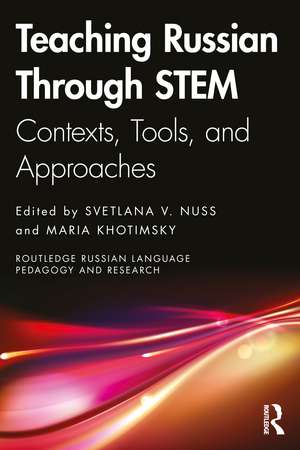Teaching Russian Through STEM: Contexts, Tools, and Approaches: Routledge Russian Language Pedagogy and Research
Editat de Svetlana V. Nuss, Maria Khotimskyen Limba Engleză Paperback – 30 dec 2024
This edited collection, which draws on the experiences and expertise of a range of international contributors, addresses the challenges of teaching Russian with greater morphological complexity, focusing on vocabulary and syntax specific to STEM contexts. Through a variety of case studies readers will access a theoretical foundation and practical examples of how to design and implement content-based courses with a focus on STEM. The book explores the challenges and opportunities of teaching Russian in the context of STEM, providing educators with the tools and knowledge to create engaging and relevant language courses for today’s students.
Teaching Russian Through STEM will be of interest to Russian language instructors, curriculum developers, and researchers in the field of Russian language pedagogy. It will be particularly valuable for those interested in innovating their language courses to align with the growing demand for STEM education.
| Toate formatele și edițiile | Preț | Express |
|---|---|---|
| Paperback (1) | 348.48 lei 3-5 săpt. | +20.43 lei 6-12 zile |
| Taylor & Francis – 30 dec 2024 | 348.48 lei 3-5 săpt. | +20.43 lei 6-12 zile |
| Hardback (1) | 937.13 lei 6-8 săpt. | |
| Taylor & Francis – 30 dec 2024 | 937.13 lei 6-8 săpt. |
Preț: 348.48 lei
Nou
Puncte Express: 523
Preț estimativ în valută:
66.68€ • 68.79$ • 55.65£
66.68€ • 68.79$ • 55.65£
Carte disponibilă
Livrare economică 06-20 martie
Livrare express 19-25 februarie pentru 30.42 lei
Preluare comenzi: 021 569.72.76
Specificații
ISBN-13: 9781032620657
ISBN-10: 103262065X
Pagini: 254
Ilustrații: 62
Dimensiuni: 156 x 234 x 18 mm
Greutate: 0.4 kg
Ediția:1
Editura: Taylor & Francis
Colecția Routledge
Seria Routledge Russian Language Pedagogy and Research
Locul publicării:Oxford, United Kingdom
ISBN-10: 103262065X
Pagini: 254
Ilustrații: 62
Dimensiuni: 156 x 234 x 18 mm
Greutate: 0.4 kg
Ediția:1
Editura: Taylor & Francis
Colecția Routledge
Seria Routledge Russian Language Pedagogy and Research
Locul publicării:Oxford, United Kingdom
Public țintă
Professional Practice & DevelopmentCuprins
Part I
Contextualizing the teaching of Russian as a foreign language through STEM
1. History and modern practices of integrating STEM in the teaching of Russian as a new or heritage language
2. Pathways for engaging climate, energy, and sustainability in the Russian language classroom
3. Maximizing student learning outcomes in ‘Scientific Russian’: A case study
4. Designing content-based STEM modules for teaching advanced Russian
Part II
Engaging diverse audiences and professional fields
5. STEM-based intensive summer language program Russian in the Sky and Outer Space
6. Russian for construction professionals in secondary vocational schools
Part III
Harnessing the power of corpus: New approaches to material development and textbook evaluation
7. Russian for Special Purposes: Corpus-based approaches to vocabulary selection
8. Mathematicon: A corpus-based platform for teachers and students of RFL
9. A CLIL perspective on content, procedures, and language: Comparing instructions in elementary school science teaching materials
Part IV
Expanding pedagogical horizons in teaching Russian through STEM
10. Pedagogy of Teaching Russian Through STEM in the 21st Century
Contextualizing the teaching of Russian as a foreign language through STEM
1. History and modern practices of integrating STEM in the teaching of Russian as a new or heritage language
2. Pathways for engaging climate, energy, and sustainability in the Russian language classroom
3. Maximizing student learning outcomes in ‘Scientific Russian’: A case study
4. Designing content-based STEM modules for teaching advanced Russian
Part II
Engaging diverse audiences and professional fields
5. STEM-based intensive summer language program Russian in the Sky and Outer Space
6. Russian for construction professionals in secondary vocational schools
Part III
Harnessing the power of corpus: New approaches to material development and textbook evaluation
7. Russian for Special Purposes: Corpus-based approaches to vocabulary selection
8. Mathematicon: A corpus-based platform for teachers and students of RFL
9. A CLIL perspective on content, procedures, and language: Comparing instructions in elementary school science teaching materials
Part IV
Expanding pedagogical horizons in teaching Russian through STEM
10. Pedagogy of Teaching Russian Through STEM in the 21st Century
Notă biografică
Svetlana V. Nuss teaches Russian at the University of Alaska (USA) and online graduate courses in the Bilingual Education and TESOL Certification program at Grand Canyon University (USA). As a teacher educator with expertise in a low-incidence EL setting, Dr. Nuss works with school districts developing their EL coaching programs for teachers.
Maria Khotimsky received her Ph.D. from the Department of Slavic Languages and Literatures at Harvard University (USA). Dr. Khotimsky has been teaching at the Massachusetts Institute of Technology (USA) since the fall of 2012, restarting the Russian language program there after a 15-year hiatus. Her research interests include language pedagogy (using digital technology and content-based courses), STEM and language learning, translation studies, and translingual poetry.
Maria Khotimsky received her Ph.D. from the Department of Slavic Languages and Literatures at Harvard University (USA). Dr. Khotimsky has been teaching at the Massachusetts Institute of Technology (USA) since the fall of 2012, restarting the Russian language program there after a 15-year hiatus. Her research interests include language pedagogy (using digital technology and content-based courses), STEM and language learning, translation studies, and translingual poetry.
Descriere
Teaching Russian Through STEM: Contexts, Tools, and Approaches addresses the growing demand for language courses that align with the interests of students who are increasingly majoring in the fields of science, technology, engineering, and mathematics.






